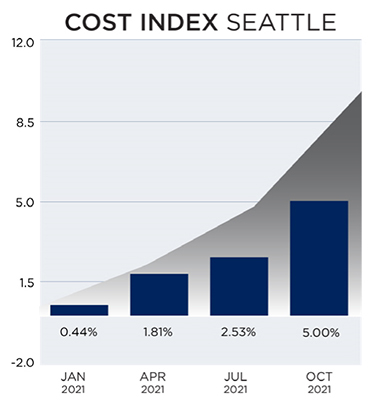|
Subscribe / Renew |
|
|
Contact Us |
|
| ► Subscribe to our Free Weekly Newsletter | |
| home | Welcome, sign in or click here to subscribe. | login |
Construction
| |
January 18, 2022
Construction costs jump more in Seattle than other US cities

A new report from Rider Levett Bucknall shows a 10.09% increase in construction costs in Seattle for the 12 months that ended in October. The fourth quarter report puts Seattle above 11 other U.S. cities when it comes to construction cost inflation.
Nationally, the jump in construction costs over the year was 7.42%. Other cities with high construction inflation were Washington, D.C., at 9.11% and Chicago at 9.01%. Portland saw a rise of 7.55%. The two cities with the lowest numbers were Honolulu (4.13%) and Denver (4.43%).
Although prices jumped the most in Seattle, the Emerald City was still cheaper to build in than seven other cities in RLB's survey. The most expensive place was San Francisco, followed by New York City. It was nearly 46% more expensive to build in San Francisco than in Seattle. The least expensive market to build in was Las Vegas, which was nearly 23% cheaper than Seattle.
Seattle also led the nation in construction price increases between July 1 and Oct. 1, the latest recorded quarter of data. For this period, the national average increase in construction costs was 1.82% — a big jump over the same period in 2020, which was .25%. Seattle logged an increase of 5% over the latest quarter, followed by Boston (2.66%) and Chicago (2.28%). Portland saw a rise of 1.33%. The smallest jumps were recorded for Washington, D.C., at .37%, and Honolulu, at .94%.
Construction inflation was more rampant in Canada, according to RLB's yearly data from two major cities up north. Toronto was the inflation king, with a 13.25% jump, followed by Calgary, with a 10.28% hike. Over the last quarter, construction costs were up 2.44% in Toronto and 1.95% in Calgary.
RLB says its cost index tracks the “true” bid cost of construction: labor and materials, taxes, and general contractor and subcontractor overhead costs and fees.
In the report, Julian Anderson, president of RLB's North America operations, said the cost increases are reminiscent of those experienced from 2004 through 2007. Anderson added that another area of concern is the labor shortage.
“The American Trucking (Associations) claims the industry is short 80,000 drivers,” Anderson said. “Officials from the (Associated) General Contractors have said that while spending on many categories of public construction will increase as the cash from the bipartisan infrastructure bill begin to flow, skilled labor shortages were impacting construction schedules and budgets and prompting some owners to delay or cancel projects. The AGC has urged the Biden administration to invest more in career and technical education programs that serve as a pipeline into construction careers.”


